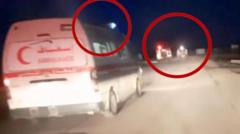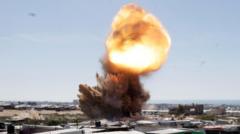An Israeli Defense Forces inquiry attributes the killing of 15 medical workers in Gaza to an "operational misunderstanding," leading to the dismissal of a unit's deputy commander. The incident occurred amid claims of a perceived threat during an uncoordinated approach by emergency vehicles.
IDF Investigation Reveals “Operational Misunderstanding” Behind Gaza Medics’ Deaths

IDF Investigation Reveals “Operational Misunderstanding” Behind Gaza Medics’ Deaths
The Israeli military admits failings led to the deaths of 15 emergency responders in Gaza, sparking outrage and calls for independent investigations.
In a recent report, the Israeli Defense Forces (IDF) described the deaths of 15 emergency workers in Gaza as a "tragic consequence of an operational misunderstanding." The incident unfolded on March 23, when a convoy from the Palestinian Red Crescent Society (PRCS), including ambulances and a UN car, was fired upon by Israeli troops. The IDF acknowledged this followed a breach of orders and a series of operational failures.
The inquiry concluded with the dismissal of the unit's deputy commander for submitting an incomplete report during debriefing. While the IDF noted that six of the deceased were allegedly Hamas members, it failed to provide evidence of their affiliations, leading to further scrutiny. The initial narrative suggested that the convoy was approached under suspicious circumstances. However, this was revised after a video recovered from a slain medic's phone disputed these claims, showing that the vehicles were traveling with lights on and marked as emergency responders.
The report emphasized that poor night visibility contributed to the commander's failure to identify the vehicles as ambulances. The incident has drawn condemnation from international organizations, including the Red Cross, which have called for an independent probe. Interestingly, this isn't the first time the IDF faced consequences after such incidents; similar actions were taken following the deaths of aid workers from the World Central Kitchen in 2022.
This incident comes against the backdrop of Israel's broader military operations in Gaza, which escalated following a high-casualty attack on Israel in October 2023 and has since resulted in over 51,000 deaths in the territory, according to local health authorities. The violence and the tragic loss of life among medical workers highlight the urgent need for accountability and transparency in conflict zones.
The inquiry concluded with the dismissal of the unit's deputy commander for submitting an incomplete report during debriefing. While the IDF noted that six of the deceased were allegedly Hamas members, it failed to provide evidence of their affiliations, leading to further scrutiny. The initial narrative suggested that the convoy was approached under suspicious circumstances. However, this was revised after a video recovered from a slain medic's phone disputed these claims, showing that the vehicles were traveling with lights on and marked as emergency responders.
The report emphasized that poor night visibility contributed to the commander's failure to identify the vehicles as ambulances. The incident has drawn condemnation from international organizations, including the Red Cross, which have called for an independent probe. Interestingly, this isn't the first time the IDF faced consequences after such incidents; similar actions were taken following the deaths of aid workers from the World Central Kitchen in 2022.
This incident comes against the backdrop of Israel's broader military operations in Gaza, which escalated following a high-casualty attack on Israel in October 2023 and has since resulted in over 51,000 deaths in the territory, according to local health authorities. The violence and the tragic loss of life among medical workers highlight the urgent need for accountability and transparency in conflict zones.





















